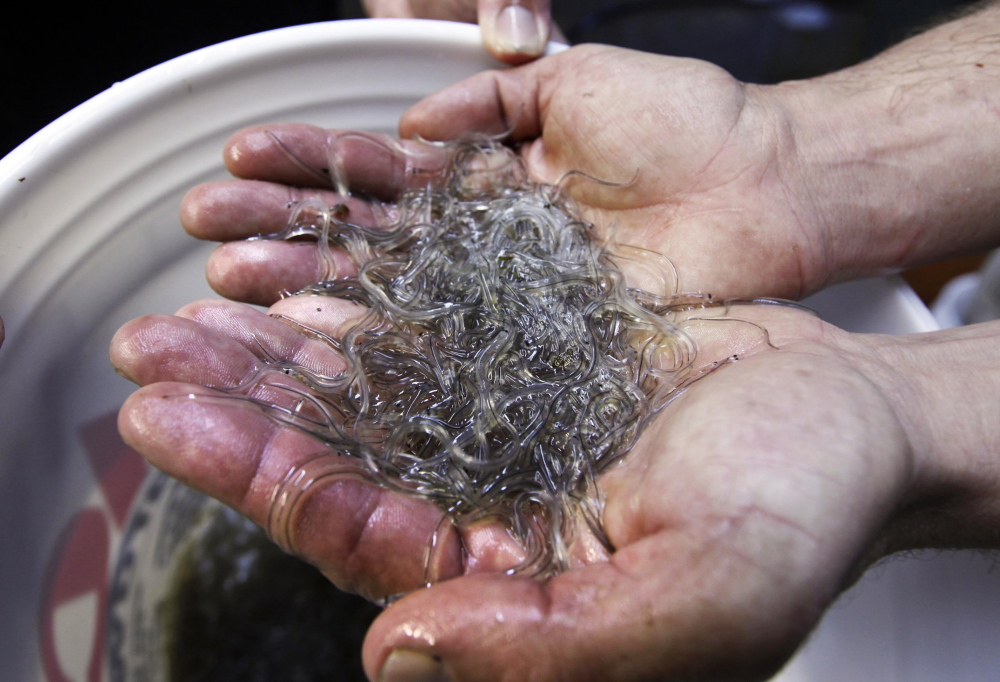AUGUSTA — Accurate reports by elver fishermen and dealers are critical to keeping a multimillion-dollar industry from being shut down, Maine’s commissioner of marine resources said Monday in announcing guilty pleas by a fisherman who earned $700,000 from the baby eels in 2012 but reported less than half of his earnings.
The agreement by Danny Deraps, 43, of Ellsworth to plead guilty to income tax evasion and theft calls for jail time, restitution and the loss of his elver harvesting license for this season, the state Attorney General’s Office said. The agreement, approved Friday, was announced Monday by Attorney General Janet Mills and Marine Resources Commissioner Patrick Keliher, six days before the start of the 2014 elver season.
“Our ability to manage and sustain Maine’s marine resources relies heavily on accurate reporting of harvester landings data,” Keliher said. “We take this very seriously and will continue to be vigilant in our efforts to ensure compliance.”
The case highlights the gold-rush mentality that the fishery has created in the past two years as market conditions in Japan, where the elvers are sold, have driven prices paid to Maine fishermen from as low as $25 a pound to as much as $2,000 a pound.
Prices soared after a 2011 tsunami in Japan wiped out eel farms. In 2012, Maine’s haul of about 20,700 pounds was worth nearly $40 million, making elvers the state’s second-most valuable fishery, after lobster. Some fishermen, such as Deraps, earned more than $100,000 during that 76-day season.
Landings declined slightly in 2013, to a total of 18,253 pounds with a value of nearly $33 million.
Elver stocks are shrinking, and fishing for the glassy, 2-inch-long creatures is legal in only two states – Maine and South Carolina. To protect the species on the eastern seaboard, the federal Atlantic States Marine Fisheries Commission has considered closing the fishery.
In response, Maine agreed to cut its harvest by 35 percent this year, to about 11,750 pounds statewide, and new legislation established a swipe-card system that will produce daily reporting data and make illegal harvesting more difficult.
The Department of Marine Resources enacted an emergency rule last year that requires dealers to submit weekly, rather than monthly, reports of how many elvers they buy from fishermen. The department took that step because, after the 2012 season, it found an 18 percent difference between landings reported by harvesters and purchases reported by dealers.
The discrepancy – 3,700 pounds – represents more than 31 percent of the quota for the coming season.
The prosecution of Deraps apparently was a result of the initiative known as the Elver Project, a multi-agency effort launched last year by the LePage administration.
Documents obtained by the Portland Press Herald through a Freedom of Access Act request show that the Elver Project involved reviews of catch records and tax filings from 2010 to 2013 to determine whether any elver fishermen who received welfare benefits had underreported or failed to report earnings.
Deraps was not accused of welfare fraud, nor was he described as a welfare recipient in Monday’s announcement.
Asked if the case was part of the Elver Project, Jeff Nichols, a spokesman for the Department of Marine Resources, said the department could “neither acknowledge nor deny the existence of any specific investigation.”
According to the Attorney General’s Office, the state investigated Deraps’ 2012 harvest reports and found that he earned $700,000 from elvers and nearly $70,000 from lobstering. He reported less than half of those earnings on his 2012 tax return, and also underreported his lobster fishing income for 2010 and 2011.
Deraps agreed to 364 days of jail time on the state charges, with all but 90 days suspended. He recently paid more than $25,338 toward his state income tax debt. Maine Revenue Services is still finalizing his remaining tax liability.
A spokesman for Maine Revenue Services, David Heidrich, said Monday that the agency routinely shares information with the federal Internal Revenue Service. He said he could not say whether Deraps would also face federal tax charges.
Deraps’ attorney, Glen Porter, declined to comment on the case because sentencing isn’t complete. He said he expects the sentencing in June.
The elver fishery was primarily a cash business until last year. The season that begins Sunday will be the first in which fishermen have individual catch quotas and swipe cards to track their landings accurately. The Legislature has also adopted measures to increase the penalties for illegal harvesting and sales of elvers.
“My office will continue to work with other state agencies to pursue those who would cheat the government and those who steal public resources, no matter who or where they are or what they do for work,” Mills, the attorney general, said in a prepared statement. “In these difficult times, all Mainers must pay their fair share.”
Steve Mistler can be contacted at 791-6345 or at:
smistler@pressherald.com
Twitter: @stevemistler
Send questions/comments to the editors.



Success. Please wait for the page to reload. If the page does not reload within 5 seconds, please refresh the page.
Enter your email and password to access comments.
Hi, to comment on stories you must . This profile is in addition to your subscription and website login.
Already have a commenting profile? .
Invalid username/password.
Please check your email to confirm and complete your registration.
Only subscribers are eligible to post comments. Please subscribe or login first for digital access. Here’s why.
Use the form below to reset your password. When you've submitted your account email, we will send an email with a reset code.